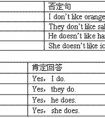句型转换1. She does her homework every day.(改为否定句) She ________ ________ her homework every day. 2. Amy likes reading. (对划线部分提问) ________ ______-七年级英语
题文
| 句型转换 |
| 1. She does her homework every day.(改为否定句) She ________ ________ her homework every day. 2. Amy likes reading. (对划线部分提问) ________ ________ Amy like ________ ? 3. Sandy helps Kitty and Kitty helps Sandy. (改为同义句) Sandy and Kitty help ________ ________ . 4. I go to school every day. (用Millie代替I作主语) Millie ________ to school every day. 5. I want to go to China's Space Museum. (改为同义句) I ________ ________ to go to China's Space Museum. |
答案
| 1. doesn't do 2. What does; doing 3. each other 4. goes 5. would like |
据专家权威分析,试题“句型转换1. She does her homework every day.(改为否定句) Sh..”主要考查你对 相互代词,实义动词,助动词的单数第三人称形式,一般现在时,特殊疑问句 等考点的理解。关于这些考点的“档案”如下:
相互代词实义动词助动词的单数第三人称形式一般现在时特殊疑问句
考点名称:相互代词
- 相互代词:
就是表示相互关系的代词。它与它所指代的名词或代词是一种互指关系,因此它们是复数或者二者以上。
英语中的相互代词只有两个,即each other和one another。
在正式文体中多用each other指两者,用one another指两者以上。
我们应当把它们当作复合代词看待,即使在分开使用时,它们也是相互关联的。
在句中,相互代词可用作宾语、定语等。例如:
Don't talk to each other (one another).
We must help one another. - 相互代词的用法:
相互代词只有each other和one another两个词组。他们表示句中动词所叙述的动作或感觉在涉及的各个对象之间是相互存在的,例如:
It is easy to see that the people of different cultures have always copied each other.
显而易见,不同文化的人总是相互借鉴的。
相互代词的句法功能:
a. 作动词宾语;
We often help each other in our lessons.
我们经常在功课上互相帮助。
They see one another every day.
他们每天见面
b. 可作介词宾语;
Does bark, cocks crow, frogs croak to each other.
狗吠、鸡鸣、蛙儿对唱。
说明:传统语法认为,相互关系存在于两个人或物之间用each other,存在于两个以上人和物之间用one another。
现代英语中,两组词交替使用的实例也很多,例如:
He put all the books beside each other.
他把所有书并列摆放起来。
He put all the books beside one another.
他把所有书并列摆放起来。
Usually these small groups were independent of each other.
这些小团体通常是相互独立的。
c.作定语时须用所有格
The students borrowed each other's notes.
学生们互借笔记。 相互代词each other和one another的区别:
1. 一般认为 each other 指两者,other another指三者或三者以上。但在实际运用中,这两个短语常可互换:
We respect each other [one another]. 我们互相尊重 (对方)。
The sea and the sky seemto melt into one another [each other]. 大海和蓝天似乎融为一体。
2. 两者均有所有格:They know each other’s [one another’s] weak points. 他们都彼此了解对方的缺点。
3. each other 可折开用 (each…the other),而 one another则不能:
We helped each other. =We each helped the other. 我们互相帮助。
4. 汉语的“互相”是副词,但是英语中的 each other 和 oneanother均为代词,因此在及物动词之后可直接用作宾语 (如help eachother);
而在不及物动词之后,则要借助介词 (如talk to each other, learn from one another 等)。
5.这两个短语均不能用作主语:
正:We each know what the other thinks.
误:We know what each other [one another] thinks.
正因为不能用作主语,所以用它们作宾语的句子不能改为被动语态。
考点名称:实义动词
- 实意动词:
即行为动词,表示动作的动词。实义动词与系动词是相对的,能独立用作谓语。
它分为及物动词和不及物动词两种:
及物动词是指后面要求有直接宾语的动词;
不及物动词指后面不需要跟宾语的动词。 实意动词使用方法:
及物动词
后面必须跟宾语意义才完整的实义动词,叫做及物动词(transitive verb)。如:
I believe that the committee will consider our suggestion.我相信委员会将会考虑我们的建议。
“How long can I keep the book ?”Harry asked.哈里问:“这本书我可以借多久?”
Dr. Bethune set us a good example. 白求恩大夫给我们树立了好榜样。
Crude oil contains many useful substances.原油含有许多有用的物质。
不及物动词
本身意义完整后面不须跟宾语的实义动词,叫做不及物动词(intransitive verb)。如:
Birds fly.鸟会飞。
It happened in June 1932.这件事发生于一九三二年六月。
My watch stopped.我的表停了。
She spoke at the meeting yesterday evening. 她在昨天晚上的会上发了言。
兼作及物动词和不及物动词
英语里有不少实义动词可以兼作及物动词和不及物动词。这样的动词又有两种不同的情况
a)兼作及物动词和不及物动词时,意义不变。试比较:
Shall I begin at once?我可以立刻开始吗?(begin作不及物动词)
She began working as a librarian after she left school.她毕业后当图书馆管理员。(began作及物动词)
When did they leave Chicago?他们是什么时候离开芝加哥的?(leave 作及物动词)
They left last week. 他们是上周离开的。(left 作不及物动词)
b)兼作及物动词和不及物动词时,有时意义不尽相同。如:
Wash your hands before meals.饭前要洗手。
Does this cloth wash well? 这布经得起洗吗?- 英汉实意动词用法比较:
与汉语的比较,有时英语动词的及物和不及物的用法,与汉语的用法不一样,请注意下列两种情况:
a)有的动词在英语里只能用作不及物动词,而汉语则可用作及物动词,如arrive到达,agree同意,listen听。英语里这些动词后面常接介词。如:
We arrived at the railway station at noon.
我们于中午到达火车站。(at不能省去)
(比较:We reached the railway station at noon.)
Everybody listened to the lecture with great interest.
每个人都很有兴趣地听讲课。(to不可省去)
(比较:We all heard the lecture.)
Do they agree to the plan?他们同意这个计划吗?(to不可省去)
b)有的动词在英语里能用作及物动词,而在汉语里则不能用作及物动词,如serve为…服务。
Our children are taught to serve the people wholeheartedly.
我们的儿童被教以全心全意为人民服务
用于be动词之后,实义动词之前。 实意动词的用法:
肯定句:
主语+动词过去式+其它
否定句:
主语+助动词didn‘t+动词原型+其他
一般过去式:
Did+主语+动词原型+其他
考点名称:助动词的单数第三人称形式
- 最新内容
- 相关内容
- 网友推荐
- 图文推荐
| [家长教育] 孩子为什么会和父母感情疏离? (2019-07-14) |
| [教师分享] 给远方姐姐的一封信 (2018-11-07) |
| [教师分享] 伸缩门 (2018-11-07) |
| [教师分享] 回家乡 (2018-11-07) |
| [教师分享] 是风味也是人间 (2018-11-07) |
| [教师分享] 一句格言的启示 (2018-11-07) |
| [教师分享] 无规矩不成方圆 (2018-11-07) |
| [教师分享] 第十届全国教育名家论坛有感(二) (2018-11-07) |
| [教师分享] 贪玩的小狗 (2018-11-07) |
| [教师分享] 未命名文章 (2018-11-07) |


